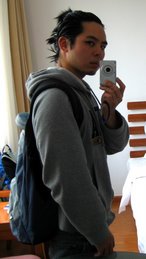When I was an undergraduate, someone forwarded me a "You know you're Japanese-American if..." list. Habits that I had once thought peculiar to my family were suddenly revealed as characteristic of my entire demographic. For example, we all save Kool-Whip containers and use them as tupperware and containers for office supplies, like rubber bands or paper clips. Who knew?!? And why does it have to be Kool-Whip? I'm not sure, but I thought this was an idiosyncrasy practiced only by my family.
I also discovered that our family is not alone in mixing mayonnaise and soy sauce to make a dip for broccoli, asparagus, artichoke, and other firm green vegetables. And in making this concoction, Japanese-Americans only use "Best Foods Real Mayonnaise" [known as Hellmann's east of the Rockies]. We all pack obento for any car trip of more than an hour. And our doctors, dentists, optometrists, and orthodontists are all Japanese-American. (Note: this one is so, SO sadly true. Unable to find another Japanese physician at Kaiser, my mother sent me to Dr. Kawaoka, a pediatrician, through my first year of college. Waiting for the nurse to call me in, I sat among kindergarteners and crying infants with ear infections. I was the only patient in the waiting room old enough to vote. In fact, we needed special permission to make appointments with Dr. Kawaoka, since, ostensibly, he accepted patients only under 16.)
So today I drove out to Gardena (a Japanese-American ghetto) to see the optometrist. My Auntie May and Uncle Hodge (the same uncle whom Jennifer nearly razed to the ground with her highfalutin ideas) live only a few miles from the eye doctor, so I thought it would be nice to take them some Rascal's Chinese chicken salad and teriyaki chicken for lunch.
To help him recuperate from his stroke, Uncle Hodge has physical therapy several times a week, so he was out when I arrived, but Auntie May was there to welcome me. I don't get many chances to visit with her, so I decided to stay and chat a spell.
After an exchange of the usual pleasantries, we delved into more interesting topics.
"Most of our friends are in their 70s--or 80s!--so they're dropping like flies," she began. That was the very expression she used: dropping like flies. No sweet chuckle or wry smile to temper such a morose thought with a little humor. No, indeed, she said it in a most matter-of-fact tone, the same way I'd say "this casserole tastes terrible," or "I hear green is the new color of the season." Dropping like flies. "Well, that's what happens when you get to be our age," she continued, without a trace of melancholy in her voice. She was relaying pure fact without injecting any subjective analysis.
We then discussed my trip to China, and my current job as an SAT instructor. Uncle Hodge has accused Auntie May of becoming increasing forgetful, an allegation which, during my visit, proved true. Whereas Alvin is loath to hear any of my stories more than once, Auntie May seemed more than pleased to listen to my antics in Beijing in multiple tellings. She invited me to tell her no less than three times with a hearty, "So what was China like?" with each solicitation with the same alacrity as the one it followed. I love telling my stories from China, and if I repeat them all to the same person, so much the better. :)
We moved on from my adventures to Auntie May's. She had been to China in the 1970s, right after Richard Nixon opened up the PRC to foreign tourists. After comparing her experience of China with mine, I asked her about her trip through the Brazilian rainforests. Auntie told me about one of Uncle Hodge's school friends from Japan who tracked him down here in America. The man was on a navy boat that was stopping by a port in California before reaching its final destination.
"Hodge hasn't heard from him since then; maybe he's expired in the interim."
All this talk of expiration and dropping flies reminded me of the impending extinction of a whole Japanese generation--Auntie May's generation. Within the last 18 months, both my great-uncle and grandmother have passed away. While ruminating on this on the drive home, a new idea ALIGHTED in my mind: record an audio history of the experience of Japanese-Americans forced into the internment camps. We have a very small window to capture their experiences, before this living part of history is lost.
Subscribe to:
Post Comments (Atom)


No comments:
Post a Comment